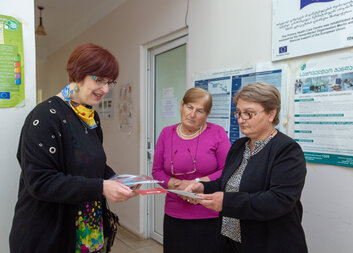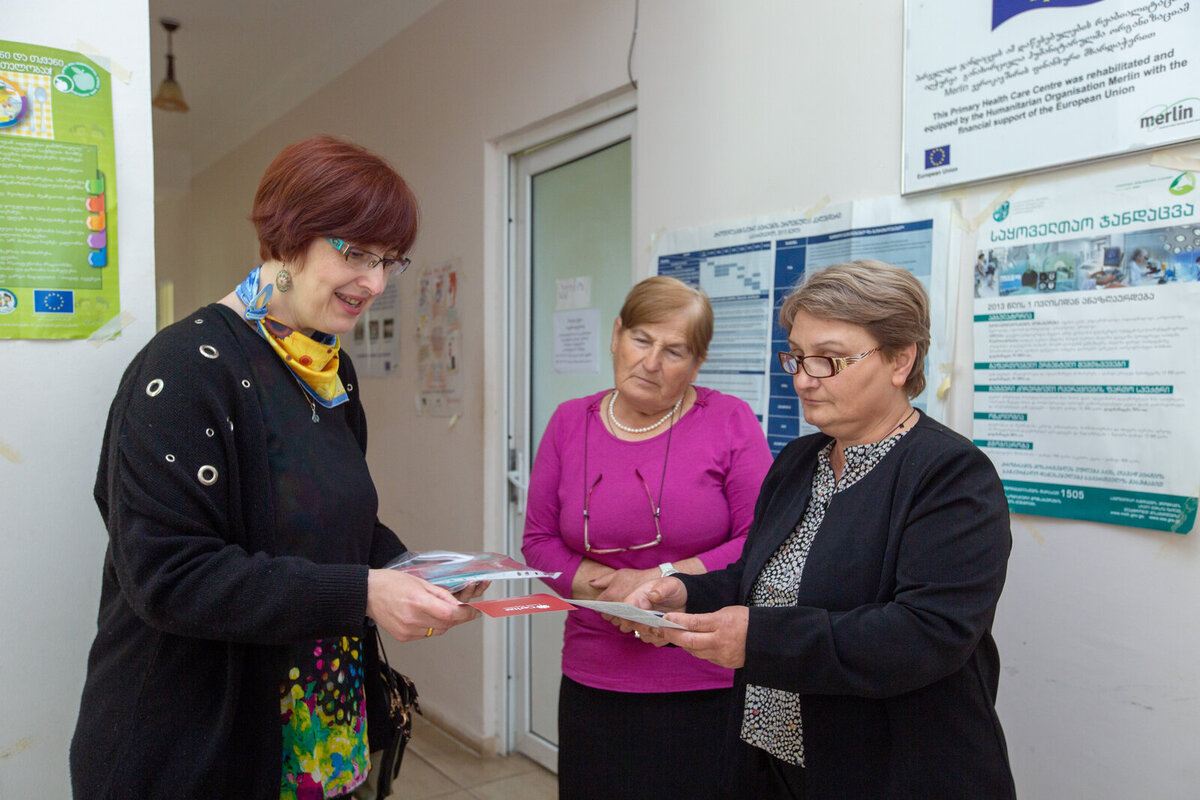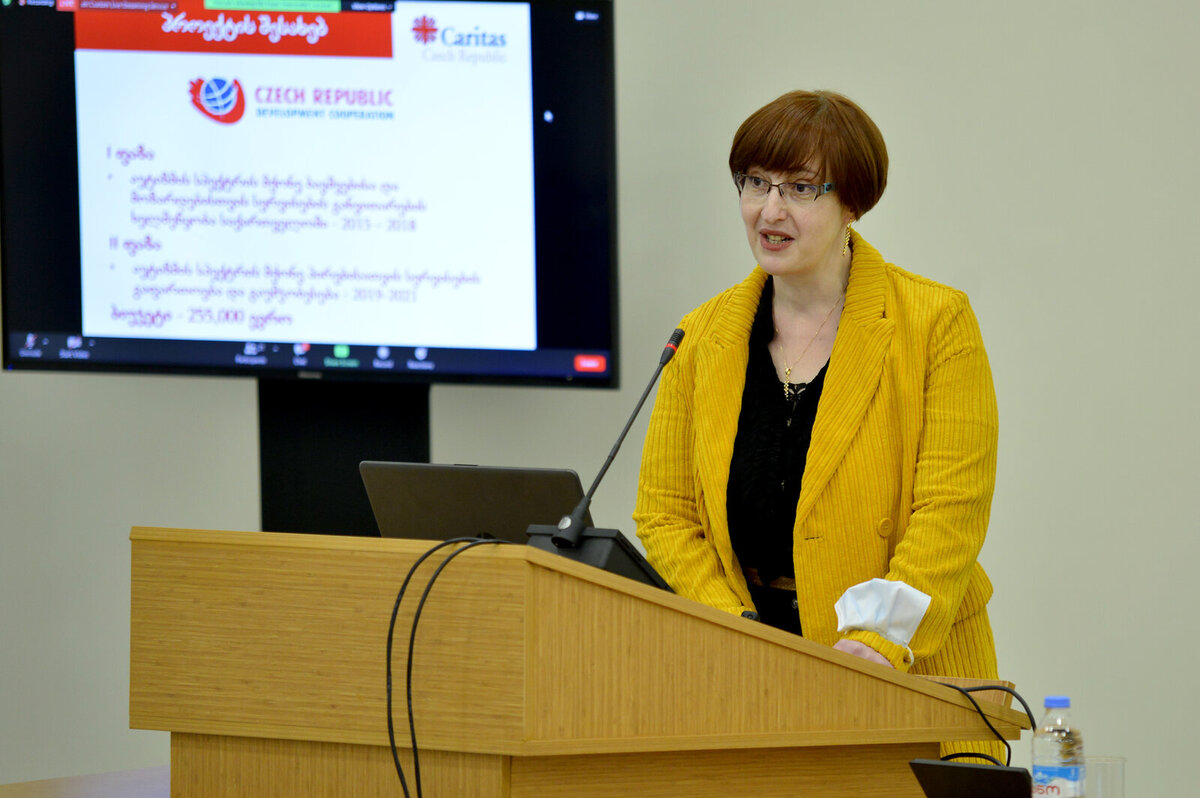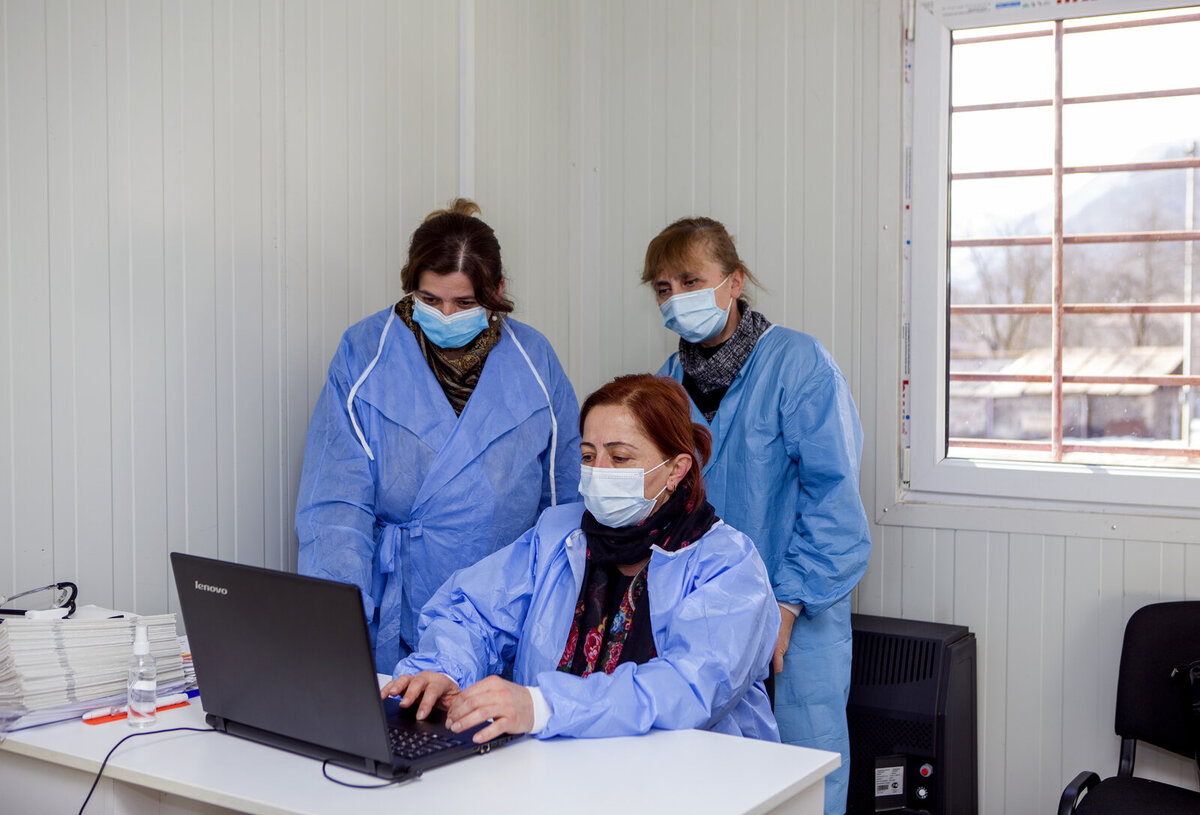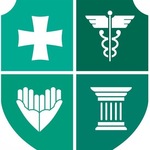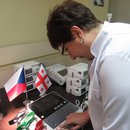Would you like to know more about the Humanitarian Aid and Development Cooperation department at Caritas Czech Republic country office in Georgia? We launched a series of interviews with our colleagues who will tell you more about our work in Georgia. This time we interviewed Rusudan Chkhubianishvili, Project Manager at our office in Georgia.
You have been working in the field of development cooperation since 2005 and managed healthcare projects of the highest importance for our country. Since 2015, Caritas Czech Republic is lucky to have you on board as with your efforts, our organization has much contributed to the development of primary healthcare in Georgia. What are the main achievements of our organization’s work you would like to highlight?
Primary health care is the most important sector of health care, through which it is possible to protect the health of the population – prevent diseases, promote public health, and manage not only acute health problems but also chronic diseases with the highest burden of premature death. Strengthening primary health care should be a high priority for all governments, as primary health care can ensure continuity of health services, patient-centeredness, and efficient use of public resources. Therefore, it is very important for the state that primary health care services are of high quality, subject to measurement, family doctors have high trust from the population, and referrals to specialists and hospitals are made purposefully.
Caritas Czech Republic has been working to improve the quality of primary health care services since 2017 when the Czech and Georgian governments signed an agreement on cooperation in the field of primary health care. In particular, the Ministry of Health of Georgia wanted to create quality improvement and assessment tools for primary health care services and a model that would lead to the creation of a quality management system throughout the country. For the past six years, Caritas Czech Republic has been working closely with the Ministry and primary health care providers with the financial support of the Czech Development Agency. Over the years, we have worked with dozens of pilot primary health care facilities to improve internal primary health care quality management, provide them with the latest evidence on the management of the most common chronic diseases, promote public health, and introduce a facility-level performance management system. During these years, we have worked with about 50 primary health care centers in cities and rural areas.
Working with rural outpatient clinics was particularly challenging, since the primary health care staff of rural outpatient clinics, who were under central control, had not had the opportunity for years to update their medical knowledge and improve the quality of primary health care services according to evidence-based clinical guidelines and protocols. In addition, the project had a particularly ambitious goal of creating a unified primary health care management information system that would provide digitization of medical records, integration with other medical modules, and would allow the Ministry to assess the quality of medical care and even introduce a results-based reimbursement system. The contribution of the project has been enormous to the primary health care sector.
The above-mentioned information system has already been not only created but also tested in pilot facilities. At the same time, it is being used in real-time by primary health care centers. In addition to the unified management information system, electronic queue management and e-referral systems were created. Those systems also were used for booking COVID-19 vaccinations. To improve the management of COVID-19, the COVID laboratory information system was created in response to the pandemic.
By 2023, the project can already hand over the primary health care quality management model to the Ministry. 70% of the pilot primary health care facilities (Tbilisi, Dusheti, and Zugdidi) meet the health care quality standard. Also, by 2023, the unified electronic information system is ready for roll-out across the country. Rural doctors working in rural areas who do not have the opportunity to work through electronic medical records will be able to use E-MIS created within the Caritas Czech Republic project.
Speaking of primary healthcare, we should not forget about our interventions in response to the emergency caused by the pandemic. Together with UNICEF, currently, we are carrying out the third project to ensure continuity and quality of mother and child healthcare services, especially in rural areas. What was the situation when you started working on the first project supported by UNICEF and what is the impact of our joint work?
I have already mentioned above that the Czech government, through the Caritas Czech Republic, has provided a great deal of assistance to the Georgian government in response to the COVID-19 pandemic. In particular, within the framework of the project, a Covid laboratory system was created for the National Center for Disease Control and Public Health, and three cycles of long-term trainings on the issues of COVID management and vaccination were conducted for all rural doctors throughout the country in 2020-2021.
You rightly mentioned that we have also been working with UNICEF since 2020 to ensure the quality and continuity of maternal and child services in rural areas during the pandemic. At the beginning of 2020, the situation was quite hopeless, rural doctors did not know how to not only manage infection but also to provide essential health services in conditions where a parent could not bring a child to a doctor due to the lockdown or fear of delaying the infection. This affected the routine vaccination process and preventive child visits, child development assessments were no longer performed according to a prescribed schedule, and acute conditions were often managed remotely over the phone.
The UNICEF project played an important role, first of all, instilling in the doctors a sense of support from their colleagues, that they were not alone in a difficult situation with the community. Experienced pediatricians and family doctors gave them systematic training on children's health issues for 8-9 months. Initially, it was quite a challenge to involve all the doctors, since many of them did not have internet access or computer skills. At the same time, it was necessary to come up with a platform that would make it easier for all doctors to participate in training in one space and at the same time internet connection would be provided.
Subsequently, the UNICEF project made it possible not only to conduct training online but also to conduct site visits, of course, after the pandemic receded and the restrictions were eased. As a result, rural doctors got a unique opportunity to take care of quality along with continuity. To do this, the project used local resources – authoritative and experienced professionals, who offered both on-site and online supportive supervision to village doctors on issues of child growth and development, as well as management of common conditions according to modern guidelines. Special attention was paid to the production of medical documentation and the patient's medical history, which is the starting point for the provision of quality services.
In 2015-2021, huge work has been done to expand and improve services for people with an autism spectrum disorder. What were the main challenges the country faced at the initial stage of the project and how did Caritas Czech Republic’s intervention change the situation?
For Caritas Czech Republic, it was a great responsibility to take care of the development of services for people with autism spectrum disorders and especially the quality of services in the regions of Georgia. At the start of the project, services existed in several regions, but service providers had little access to professional development opportunities and professional supervision, and there was no clinical protocol for early detection, diagnosis, and management of autism services and no minimum standard of service provision. In all these areas, the project worked very successfully.
In four regions of Georgia – Kakheti, Imereti, Adjara, and Samegrelo, the quality of services was significantly improved through regular training and supervision of local staff and ABA therapists. In addition to these regions, autism services were established in Guria and Samtskhe-Javakheti with the support of the project. In both municipalities, City Halls finance the autism service. In addition, a diagnostic instrument for autism – ADOS-2 was purchased, and adapted and local professionals were trained through the project in these regions. It is also significant that the project has done a lot of work in the direction of advocacy – met with representatives of local municipalities, and proposed a ready-to-use financing model for autism services, based on which number of municipalities already started financing autism services from the municipal budget, to which Caritas Czech Republic is very much proud of.
Updating clinical protocols has always been an important part of our organization's healthcare projects. Why do we pay so much attention to this direction and how do these updated protocols change the medical services patients receive later?
The development and periodic updating of national clinical practice recommendations (guidelines) and disease management standards (protocols) are essential to ensure the quality of health care services. They help medical practitioners to manage diseases in a way that is informed by reliable world-tested evidence. In updating guidelines and protocols, donor organizations and partners actively help the Ministry, which often turns to them for help when they see the need to create new protocols or update existing ones.
Caritas Czech Republic actively helps the Ministry of Health of Georgia in this direction as well. With our support, the National Protocol for Early Detection, Diagnosis, and Management of Autism was adopted in 2018. From 2020, with the support of the Czech Development Agency and UNICEF, up to 15 protocols on the management of common chronic diseases, and delivery of preventive and child health and development services were updated and approved by the Ministry.
Within the project funded by the Czech Development Agency, our organization has been actively working on the introduction of comprehensive IT solutions for primary healthcare. When will we be able to see the final results and how will this change the everyday life of primary healthcare facilities?
As I said, the unified management information system has been created within the project since 2021 and has been tested in a number of medical institutions. From the summer of 2022, the full package of IT systems has been implemented in medical institutions in a real-time mode. The continuous testing of the system allows the Ministry to determine the capabilities of the IT system. Based on the experience of PHC professional associations, and family doctors the Ministry will decide on the further use of the system on a large scale. It is especially true for rural medical clinics, where there is no electronic medical records system to date.
However, a special regulation will be needed, which will regulate the provision of digital services at the level of primary health care. Once the electronic management system is made available to family physicians, it will facilitate their decision-making regarding disease management and preventive work. They will be able to track other electronic modules, e.g. birth registry, immunization module, etc., book appointments, and even initiate teleconsultations. Family doctors will be incentivized to provide quality services and it will benefit the patient by all means.
What are the priorities for 2023?
In 2023, the project "Support to primary health care strengthening in Georgia" will continue to work with the Ministry. In particular, if the Ministry makes a final decision regarding the introduction of information systems, the project team will help in the implementation, work together with the Information Technology Agency to make the process go smoothly and painlessly, and the handover of the systems to make effective.
In addition, the project will continue to work on updating national protocols and creating care pathways. Also, within the framework of the project, continuous medical education courses will be created and accredited and will be offered to at least 100 family doctors free of charge. At the same time, the requirements and standards for the qualification of primary health care personnel will be updated.
Would you like to add anything?
The interventions implemented by the Caritas Czech Republic in primary health care proved to be extremely timely and innovative. The information systems created within the project became an opportunity for other partners to start taking care of other aspects of the primary health care reform, one of which is, for example, the creation of differentiated financing mechanisms that will be linked to quality and results. It would be impossible to achieve this without an information system. The role of information systems is immeasurable, and without it you cannot keep up with the demands of modern health care.
Accordingly, many thanks are due to the Czech Development Agency, which gave the opportunity to the Georgian government to implement such an important project for the further development of healthcare in Georgia.

